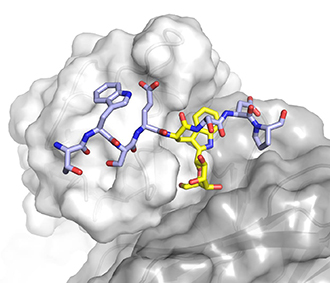Wang XS, Jiou J, Cerra A, Cobbold SA, Jochem M, Mak KHT, Corcilius L, Silke J, Payne RJ, Goddard-Borger ED, Komander D, Lechtenberg BC. The RBR E3 ubiquitin ligase HOIL-1 can ubiquitinate diverse non-protein substrates in vitro. Life Science Alliance. 2025;8(6):10.26508/lsa.202503243
Heydarchi B, D’Silva DB, Wong H, Goddard-Borger ED, Wicks IP. Fc mutagenesis enhances the functionality of anti-RhD monoclonal antibodies. Blood Advances. 2025;9(7):10.1182/bloodadvances.2024015082
DeBono NJ, D’Andrea S, Bandala-Sanchez E, Goddard-Borger E, Zenaidee MA, Moh ESX, Fadda E, Harrison LC, Packer NH. The molecular basis of immunosuppression by soluble CD52 is defined by interactions of N-linked and O-linked glycans with HMGB1 box B. Journal of Biological Chemistry. 2025;301(4):10.1016/j.jbc.2025.108350
Sharma M, Pudlo N, Järvå MA, Kaur A, John A, Burchill L, Lingford JP, Epa R, Abayakoon P, Scott NE, Turkenburg JP, Davies GJ, Martens EC, Goddard-Borger ED, Williams SJ. Sulfoglycolysis sustains Eubacterium rectale in low-fiber diets. Journal of Biological Chemistry. 2025;301(3):10.1016/j.jbc.2025.108320
Burchill L, Sharma M, Soler NM, Goddard-Borger ED, Davies GJ, Williams SJ. Structure, kinetics, and mechanism of Pseudomonas putida sulfoquinovose dehydrogenase, the first enzyme in the sulfoglycolytic Entner-Doudoroff pathway. Biochemical Journal. 2025;482(2):10.1042/bcj20240605
Li J, Mui JW-Y, da Silva BM, Pires DEV, Ascher DB, Madiedo Soler N, Goddard-Borger ED, Williams SJ. A Broad-Spectrum α-Glucosidase of Glycoside Hydrolase Family 13 from Marinovum sp., a Member of the Roseobacter Clade. Applied Biochemistry and Biotechnology. 2024;196(9):10.1007/s12010-023-04820-3
Arumapperuma T, Snow AJD, Lee M, Sharma M, Zhang Y, Lingford JP, Goddard-Borger ED, Davies GJ, Williams SJ. Capture-and-release of a sulfoquinovose-binding protein on sulfoquinovose-modified agarose. Organic & Biomolecular Chemistry. 2024;22(16):10.1039/d4ob00307a
Li J, Sharma M, Meek R, Alhifthi A, Armstrong Z, Soler NM, Lee M, Goddard-Borger ED, Blaza JN, Davies GJ, Williams SJ. Correction: Molecular basis of sulfolactate synthesis by sulfolactaldehyde dehydrogenase from Rhizobium leguminosarum. Chemical Science. 2024;15(2):10.1039/d3sc90238b
Kaur A, Pickles IB, Sharma M, Soler NM, Scott NE, Pidot SJ, Goddard-Borger ED, Davies GJ, Williams SJ. Widespread Family of NAD+‑Dependent Sulfoquinovosidases at the Gateway to Sulfoquinovose Catabolism. Journal of the American Chemical Society. 2023;145(51):10.1021/jacs.3c11126
Sharma M, Kaur A, Soler NM, Lingford JP, Epa R, Goddard-Borger ED, Davies GJ, Williams SJ. Defining the molecular architecture, metal dependence, and distribution of metal-dependent class II sulfofructose-1-phosphate aldolases. Journal of Biological Chemistry. 2023;299(11):10.1016/j.jbc.2023.105338






